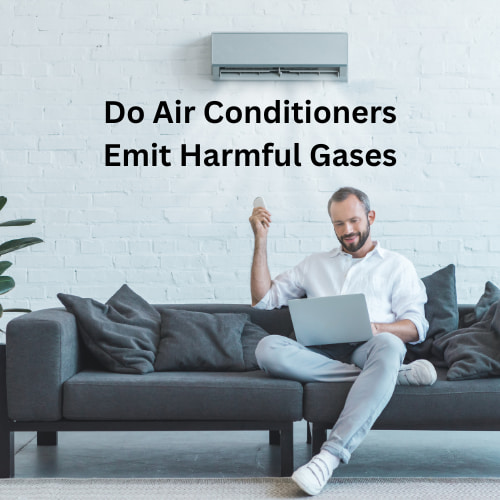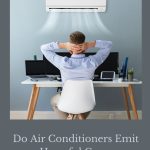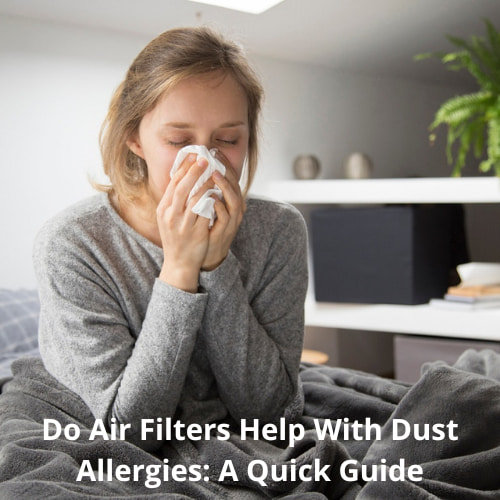Do Air Conditioners Emit Harmful Gases
Do air conditioners emit harmful gases? If your system is poorly maintained or malfunctioning, there’s a risk it may inadvertently give off undesirable emissions that are harmful to humans and the environment, such as including carbon monoxide, Freon, and other cooling agents.
This post may contain affiliate links, I earn from qualifying purchases at no extra cost to you. Click here for my disclosure policy
Your air conditioner does more than just cool your space, it’s an integral part of ensuring a healthy indoor environment. And, in turn, your indoor air quality is closely connected to your overall physical and psychological health. But what happens when your AC starts affecting your health adversely?
In this blog post, we’ll uncover signs that indicate your air conditioner might just be the hidden culprit behind unexplained health issues. Let’s look at why this happens and at efficient ways to improve your indoor air quality using your AC.

Do Air Conditioners Emit Harmful Gasses?
Before diving in, let’s address a common question many people have: Do air conditioners emit harmful gasses?
There’s a prevailing concern that air conditioning units could be contributing negatively to your indoor environmental quality. When we consider, for example, the fact that our indoor pollutant concentrations can be 2-5 times higher than outdoors – as stated by the EPA – it becomes an important query to answer.
Here’s what you need to know: If your AC unit is functioning properly and is well-maintained, it should not emit harmful gasses. However, this makes regular maintenance crucial.
If your system is poorly maintained or malfunctioning, there’s a risk it may inadvertently give off undesirable emissions that are harmful to humans and the environment, such as including carbon monoxide, Freon, and other cooling agents.
These chemicals are used by the AC to operate and should not leak into the surrounding environment, which makes it crucial to properly maintain your HVAC system.
What harmful gases are released from air conditioners?
Modern air conditioners typically do not release harmful gases directly as a result of their normal operation. However, there are a few considerations to keep in mind:
- Refrigerants: Air conditioners use refrigerants to cool the air. Older refrigerants, such as chlorofluorocarbons (CFCs) and hydrochlorofluorocarbons (HCFCs), were harmful to the environment and contributed to ozone depletion. These have been phased out due to their detrimental effects. Newer refrigerants, such as hydrofluorocarbons (HFCs) and hydrofluoroolefins (HFOs), are used in modern air conditioning systems. While these refrigerants are less harmful to the ozone layer, some HFCs have a high global warming potential if leaked into the atmosphere.
- Indoor Air Quality: Air conditioners can circulate indoor air pollutants if not properly maintained. Dust, allergens, mold spores, and other contaminants can accumulate in the system if filters and components are not cleaned regularly. These pollutants can then be recirculated into the indoor air, potentially affecting indoor air quality.
- Combustion Byproducts (In Certain Systems): In some cases, air conditioning systems may be part of larger HVAC systems that involve combustion for heating purposes. If combustion is not properly controlled or if there are leaks in the system, harmful combustion byproducts such as carbon monoxide (CO) can be released. However, this is more related to the HVAC system design and maintenance rather than the air conditioner itself.
To ensure that your air conditioner does not release harmful gases or pollutants:
- Regular Maintenance: Keep your air conditioning system well-maintained, clean filters regularly, and schedule professional inspections to ensure optimal performance and indoor air quality.
- Use of Proper Refrigerants: If you are purchasing a new air conditioner, choose a model that uses environmentally friendly refrigerants with low global warming potential.
- Proper Installation: Ensure that your air conditioner is properly installed by qualified professionals to prevent leaks and ensure efficient operation.
- Ventilation: Maintain proper ventilation in your indoor space to ensure a continuous supply of fresh air and prevent the buildup of indoor pollutants.
Overall, while air conditioners themselves do not typically release harmful gases, proper maintenance and usage are essential to maintain indoor air quality and environmental safety.
How do you know if your AC is leaking carbon monoxide?
It’s important to note that carbon monoxide (CO) is not typically a byproduct of normal air conditioning operation. CO is produced by incomplete combustion of fuels, such as those used in gas furnaces, water heaters, and other combustion appliances. However, if your air conditioning system is connected to a larger HVAC system that includes a fuel-burning component (like a furnace), there is a possibility of CO leaks if that component is malfunctioning.
Here are steps you can take to ensure your HVAC system, including any connected air conditioning components, is not leaking carbon monoxide:
- Install Carbon Monoxide Detectors: If your HVAC system is connected to combustion appliances, it’s a good idea to have carbon monoxide detectors installed in your home. Place detectors near sleeping areas and follow manufacturer recommendations for placement and maintenance.
- Schedule Professional Inspections: Have your HVAC system inspected by a qualified technician regularly, especially before the heating season. They can check for any potential CO leaks, combustion issues, and ensure proper ventilation.
- Check for Symptoms: Carbon monoxide poisoning can cause symptoms such as headaches, dizziness, nausea, confusion, weakness, and shortness of breath. If you or your family members experience any of these symptoms and suspect CO exposure, leave the area immediately and seek medical attention. If multiple people in the household are experiencing these symptoms, it could indicate a CO leak.
- Inspect Flue and Ventilation: If your HVAC system includes combustion appliances, ensure that the flue and ventilation systems are properly installed and functioning. Make sure there are no blockages or obstructions.
- Use Professional Services: Only allow qualified technicians to install, repair, and maintain your HVAC system and any connected components.
- Proper Ventilation: Ensure that your home has proper ventilation, especially in areas where combustion appliances are located. This helps prevent the buildup of CO indoors.
Remember that carbon monoxide leaks are a serious safety concern and can be life-threatening. If you suspect a CO leak, take immediate action by leaving the area, seeking fresh air, and contacting a professional to address the issue.
For regular air conditioning systems without combustion components, the risk of carbon monoxide leaks is extremely low. If you are concerned about indoor air quality or potential leaks, you can still follow general air conditioning maintenance and ventilation practices to ensure a safe and comfortable living environment.
Shop any of these stores and I receive a small commission at no cost to you.
 Echo Dot (4th Gen, 2020 rel...Shop on Amazon
Echo Dot (4th Gen, 2020 rel...Shop on Amazon Apple AirTagShop on Amazon
Apple AirTagShop on Amazon Amazon Fire TV Stick, sharp...Shop on Amazon
Amazon Fire TV Stick, sharp...Shop on Amazon
Signs That Your Air Conditioner Is Making You Sick
Now that you have the answer to the question “Do air conditioners emit harmful gasses?”, it is time to understand what happens if your AC is malfunctioning and has started to affect your health. By learning to recognize the signs of an unhealthy living environment, you can also understand when is the right time to fix or replace your air conditioner.
Let’s get started.
- You’re Experiencing an Increase in Allergy Symptoms
If you’ve noticed an uptick in your allergy symptoms recently, it’s worth taking a look at your air conditioning system. Dust, mold, or pollen may be accumulating in your AC unit and circulating throughout your home.
Regular cleaning and maintenance of your air conditioning system can help improve the quality of the air you breathe and reduce your allergic reactions.
- Persistent Dry and Irritated Skin
You clean your house regularly and efficiently, and you use the necessary products to get rid of harmful germs and bacteria. So, why do you still experience skin irritation?
This symptom could be a consequence of poor air quality in your home – which is where you spend most of your time! In an environment with high levels of pollutants, or even an overly air-conditioned room, your skin may continuously feel parched and irritated.
This is because air conditioners, especially when set to low temperatures, work by removing moisture from the air. This leads to a drier indoor environment which can essentially suck the moisture out of your skin, causing it to become dry and irritable.
- Persistent Cough and Sore Throat
If you’re frequently dealing with a persistent cough or sore throat, your air conditioning might be to blame. It’s critical to remember that dry, dusty conditions created by poor air quality can irritate your throat and respiratory system.
Therefore, maintaining optimal indoor humidity and using filter systems will help alleviate these symptoms, contributing significantly to your overall health and well-being.
- Constant Feeling of Fatigue
If you’re constantly feeling fatigued, it could be due to poor air quality within your home. The lack of fresh and clean indoor air can lead to a perpetual sense of tiredness, making you feel drained even after a seemingly good night’s rest.
Therefore, it is important to ensure proper ventilation and functional air conditioning systems in your living space for optimal indoor air quality and consequently, enhanced energy levels.
- Trouble Sleeping at Night
If you’re having trouble sleeping at night, your indoor air quality might be to blame. There are several studies showing a direct correlation between poor indoor air conditions and decreased sleep duration.
This is because the presence of pollutants in the air, such as dust, mold, or harmful chemicals, can irritate your respiratory system leading to disturbed sleep. Similarly, without proper ventilation and fresh air circulation, carbon dioxide levels can rise causing stuffiness and discomfort during the night.
- Unexplained Headaches During the Day
If you’ve been experiencing unexplained headaches during the day, it might be due to poor indoor air quality caused by a malfunctioning AC unit or a dirty filter. Pollutants and allergens present in your environment may cause discomfort and even trigger episodes of migraines.
- Increased Asthma Attacks or Difficulty Breathing
If you’re prone to asthma attacks or have difficulties breathing, your air conditioner might be a contributing factor. Simply put, malfunctioning air conditioners can circulate dust and allergens that exacerbate such health conditions, instead of improving your indoor air quality.
- Feeling Constant Dryness in Your Eyes or Nose
If you have been feeling constant dryness in your eyes or nose, your air conditioner might be playing a role. In many cases, air conditioners can excessively dry out the air, leading to uncomfortable symptoms such as these. Thus, balancing humidity levels is important for maintaining comfort and preventing such issues.

5 Ways To Improve Indoor Air Quality Using Your HVAC System
When it comes down to creating a healthy and happy home environment, your HVAC system plays a vital role. With the right strategies, you can leverage the filtering power of your AC unit to improve your indoor air quality and prevent severe health complications. Let’s see how below.
Regularly Replace or Clean Your HVAC Air Filters
One of the simplest ways to maintain good indoor air quality is by regularly replacing or cleaning your HVAC unit’s air filters. Dirt, dust, and allergens accumulate on these filters over time, obstructing airflow and compromising your home’s air quality.
Therefore, you should make a habit of checking these filters at least once a month, giving them a thorough clean or replacing them as needed for optimum performance.
Regularly Inspect Your Air Conditioner
A regular inspection of your air conditioner is crucial for maintaining good indoor air quality. You should ideally aim for yearly check-ups, or, at the very least, a thorough check before the hot season kicks in.
During these inspections, professionals can locate and rectify small issues – such as cracks and leaks – that could end up causing major malfunctions if neglected.
Ensure That Your Air Ducts Are Cleaned and Well-Maintained
When looking to improve your air quality, it is important to make it a priority to routinely check your air ducts. Over time, these ducts can accumulate dust, allergens, and other pollutants that make your home environment unhealthy and increase your risk of health complications.
Consequently, it’s essential to have your HVAC system’s ducts cleaned and well-maintained to circulate fresh air effectively.
Incorporate Natural Ventilation
Another simple way to improve indoor air quality is by embracing natural ventilation. This means allowing fresh air to flow into your home naturally through windows and doors.
This not only helps keep your living spaces cool, but it also dilutes and removes airborne contaminants by increasing the circulation of outdoor air in your home. Strike a balance between using your AC and leveraging the power of nature to create a healthy home!
Partner With a Specialist
In conclusion, never hesitate to partner with a specialist. They have the expertise and know-how to optimize your air conditioning unit for better indoor air quality. After all, breathing cleaner, healthier air is an investment worth making!
Related Posts








